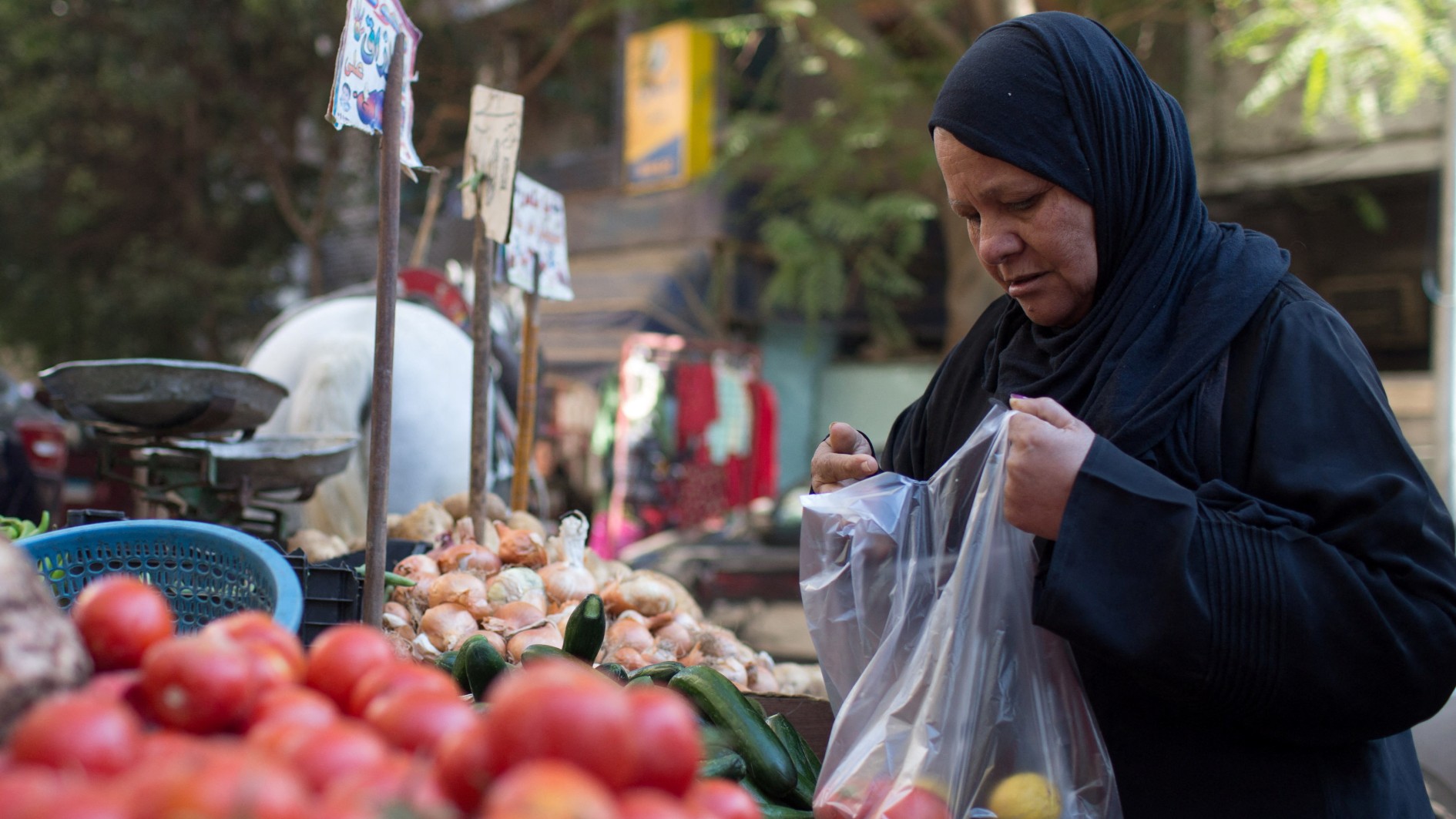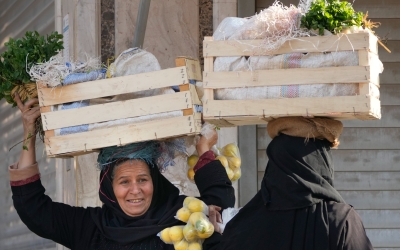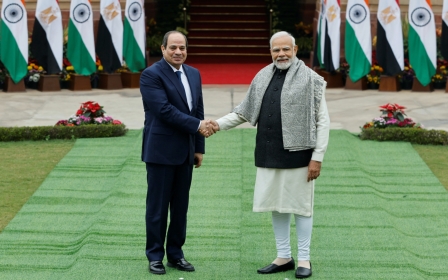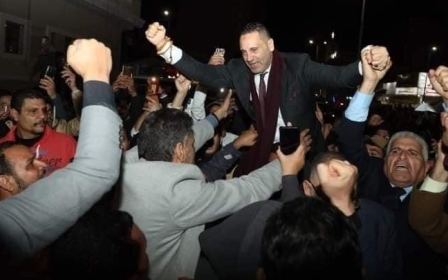Egyptians struggle to afford food as Sisi says it's 'not end of the world'
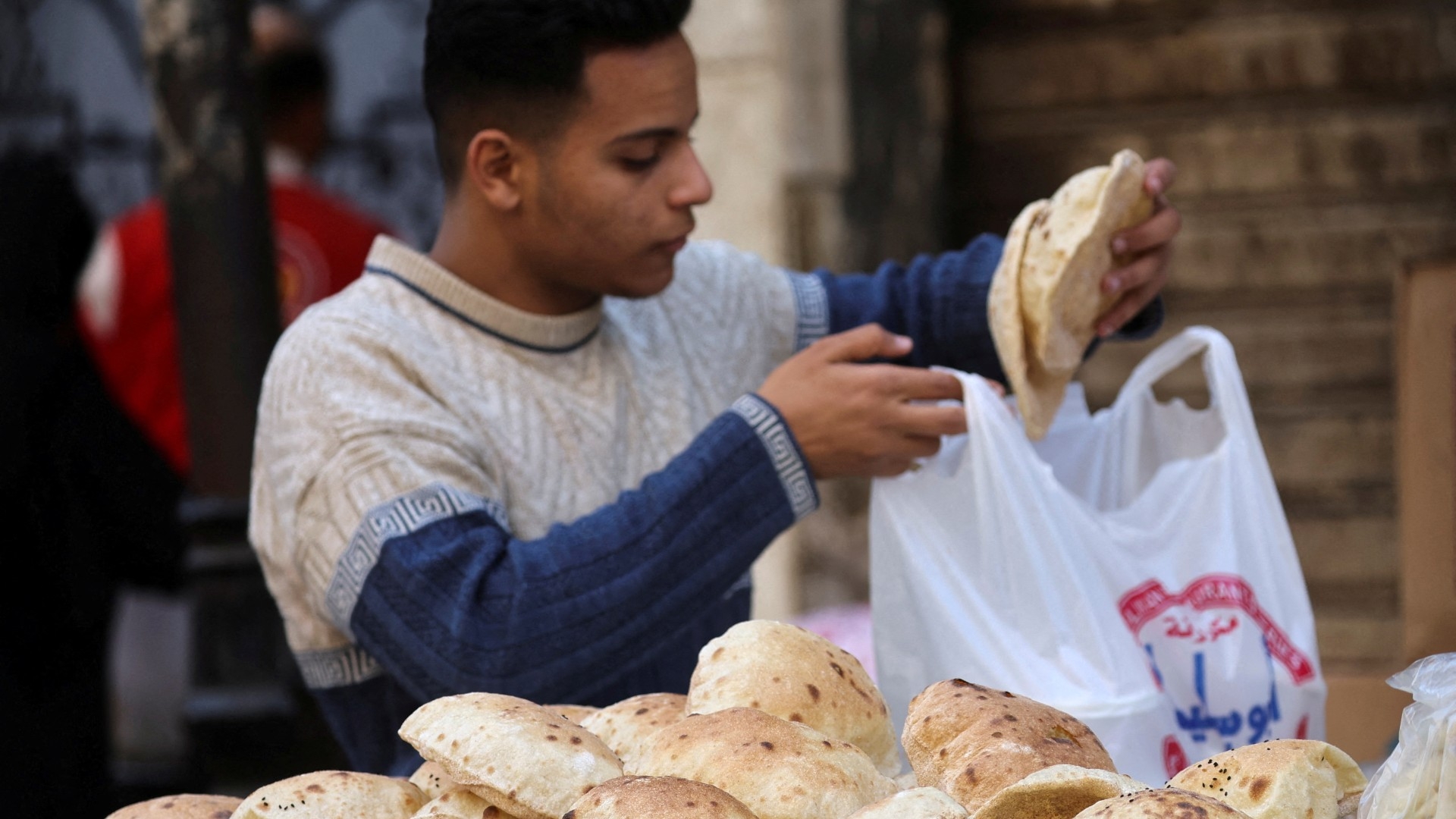
Last week, a 45-year-old woman was arrested for stealing a packet of hamburgers from a supermarket in Egypt to feed her children.
A legal source told Middle East Eye that she was released after collapsing in front of the prosecutor.
According to the source who ran into the defendant in the Amaryia Prosecution Unit in southern Cairo, she told the prosecutor that her children were hungry and she wanted to make them some food.
'Life is becoming very difficult. If you are a parent of two, how can you afford tutoring sessions, food, rent, clothes, and medicine?'
- Mona, teacher
Incidents such as these are becoming more commonplace in Egypt, as skyrocketing inflation pushes more and more families into poverty, unable to afford basic food products.
Egypt had already been reeling from the dual impacts of the Russia-Ukraine war and the Covid-19 pandemic on the import-dependent economy.
New MEE newsletter: Jerusalem Dispatch
Sign up to get the latest insights and analysis on Israel-Palestine, alongside Turkey Unpacked and other MEE newsletters
But the food price crisis has been exacerbated by the latest devaluation of the Egyptian pound, which saw it lose half its value in less than a year. This came after the International Monetary Fund approved a bailout with Cairo last month, the third deal since President Abdel Fattah el-Sisi came to power in a 2013 military coup.
The value of the Egyptian pound against the US dollar dropped from seven in 2013 to just above 30 at the time of publication.
A shift to a flexible exchange rate regime is among the main conditions of the international lender to reduce inflation and consolidate the country's spiralling debts.
But the fiscal measures have had immediate effects on the majority of Egypt's 104 million population, with an estimated 60 million people living below or just above the poverty line ($3.20 per day) before the current crisis.
In response to the reactions that highlighted the latest crisis around the cost of food in the country, Sisi attacked the media, most of it controlled by the state. "Why do you portray Egyptians as if they are in a state of panic over food and drink? This is not appropriate," he said on 23 January, addressing the media and an audience of government officials and police officers.
"I am not saying this is not true; but eating and drinking is not the end of the world," the president said.
'Eat chicken feet'
Zobaida, 43, a mother of three, in Cairo's densely populated neighbourhood of Imbaba wakes up at 5am every Thursday to stand in line at the chicken products factory next to her to get two or three kilos of chicken waste (trimmed fatty parts, feet, neck, broken wings) and bones.
She uses the waste to make "fake chicken" using vegetables and lots of bread crumbs, while she uses the bones to make broth.
"I used to buy frozen chicken which had an expiration date that was close to the cheapest prices, but now I can't afford them - but all poultry shops sell their [chicken] waste," Zobaida told MEE.
"Poverty is hitting everyone," she said, adding that "there will be flavours that the young generations will not know of because of the unbearable price hikes".
According to the government's statistical agency, the price of a kilo of chicken in January 2023 stood at EGP 72.26 ($2.39), a staggering 230 percent increase from 2013. The price of bread has witnessed a 460 percent increase in the same period, with 10 loaves of unsubsidised bread now costing EGP 14 ($0.46), up from 2.5 in 2013.
In an attempt to maintain calm - perhaps wary of how rising food prices helped spark the 2011 Arab Spring uprising in the country - the government's media machine has been trying to promote alternatives to the food products most Egyptians rely on.
For example, pro-government TV talk show hosts called on Egyptians to eat chicken instead of beef. But when chicken prices soared, they advised people to eat eggs, and after those prices soared they advised them to eat beans.
Of all the suggestions put forward, the one that has provoked the most backlash and ridicule was the National Institute for Nutrition's call earlier this year for people to switch to eating chicken feet, as a good, and cheap, source of protein instead of the rest of the chicken.
Chicken feet are not a popular part of Egyptian poultry cuisine, and are usually thrown away or sold to processed chicken products factories. Nevertheless, after the statement the price of one kilo of chicken feet rose to 20 EGP ($0.67) from 10 EGP, due to popular demand.
But for many low-income Egyptians, finding alternatives is already an existing strategy to deal with the non-stop soaring prices and the lack of subsidised products.
'The taste of meat'
Some people have taken to raising animals in their own flats in order to get eggs or to be able to eat meat once every two or three months.
Walaa, a 32-year-old hotel room service employee and part-time cleaner, said she had started raising rabbits so she could provide her family with "the taste of meat so they don't forget it".
She would prepare lunch bags for her siblings, and now rarely includes roast beef, smoked turkey or even eggs, and safely sticks to white processed cheese sandwiches or homemade jam, both of which are cheap.
"The day I include eggs for them is a lucky day because all other foods are expensive. But they are just kids who need good nutrition," she said.
"Even though part of the school fees goes to the so-called school meal, they never receive it," she told MEE.
"The government is happy about the bridges and the new cities, but what have they done for the people who live in the old cities?" she said, referring to the expensive mega-projects launched by the Sisi government, like the $58bn new administrative capital.
Likewise, Mona, a 56-year-old social studies teacher from Shubra also told MEE that she has changed many of her cooking habits because of the prices of essentials like cooking oil, butter, sugar, tea and flour.
"Life is becoming very difficult. If you are a parent of two, how can you afford tutoring sessions, food, rent, clothes and medicine? And no one from the government cares," she said.
Instead of frying vegetables, she was now either boiling them or baking them in the oven, and then adding a splash of oil.
She told MEE that she had started baking at home every weekend to save a trip to the local bakery. Instead of sending her children with the medium-sized baguette sandwiches, she resorted to homemade bread with white wheat.
"Even bread, which is the most basic of foods, is getting expensive. It is called 'aish' [which means 'life' in Arabic] because it is essential to Egyptians," she said.
The issue is not one of food supply, Mona told MEE, as there is plenty available for sale, "but no one [has the money] to buy".
"Also the goods which are officially priced by the state are sold for higher prices. For example, rice is officially for 12 EGP, but we can find it being sold for 15 and maybe 20."
'Greedy traders'
Like many countries struggling with a cost of living crisis, the Egyptian government has been keen to play down its own responsibility, instead placing the blame squarely on the Russia-Ukraine war as well as speculative "greedy traders".
Egyptian MP Alaa Abed told MEE "the crisis is global and we cannot blame the state", citing similar price hikes in the United Kingdom and Germany.
'If the government wants to regulate the prices and arrest violators they will do it - but the government just wants a scapegoat'
- Saeed al-Sonbaty, shop owner
"The government is already subsidising bread for 70 million Egyptians, a measure that no other country does. The main issue is the traders and their opportunities to profit from the crisis," he added.
Not everyone is buying this explanation, however.
Saeed al-Sonbaty, an owner of a grocery shop in Giza, said fluctuating prices were an issue the government could control.
"You can buy a packet of rice for 20 EGP at night, and by the next morning [it is priced at] 25 EGP," he told MEE.
He added that there were many families who were regular customers of his and had cut their monthly spending in half, in order to save.
"We can not entirely blame the traders as the original prices from the distributor have increased due to the transportation costs and taxes," he said.
"If the government wants to regulate the prices and arrest violators they will do it - but the government just wants a scapegoat."
Middle East Eye delivers independent and unrivalled coverage and analysis of the Middle East, North Africa and beyond. To learn more about republishing this content and the associated fees, please fill out this form. More about MEE can be found here.


